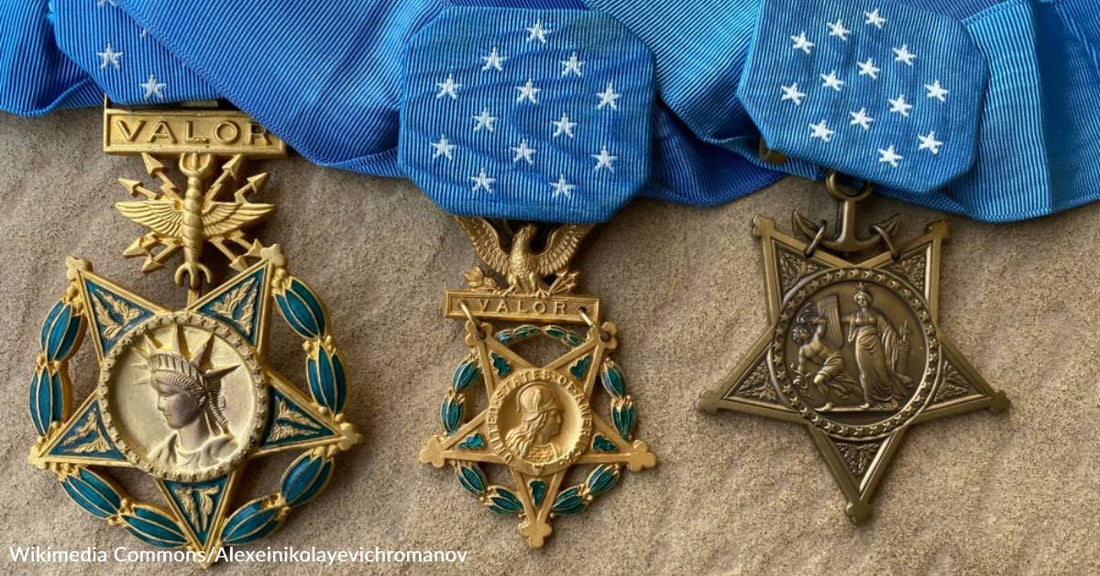American Military Medals Ranked in Order of Precedence
Elizabeth Morey
Only about one percent of Americans are in the military, which means the vast majority of us know very little about the way most things in the military work, including medals.
If you've ever wondered what the medals a military servicemember wears mean, or if you've wondered which ones rank higher than others, keep reading. This short list will outline the basic structure of the ranking of U.S. military medals.
It is worth noting that all the medals listed here are considered decorations, not awards, meaning they can be given to an individual servicemember but not to an entire unit. It is also important to remember that the precedence of these decorations will vary slightly depending on the branch of service.
The Medal of Honor
The Medal of Honor is the highest honor that can be presented to a member of the military for valor. It is awarded to those who have gone above and beyond the call of duty while "engaged in action against an enemy of the United States." This is the only military medal that must be congressionally approved by the President of the United States before it can be presented to an individual.
The first Medal of Honor was awarded in 1861 to a member of the U.S. Navy. Now there are three different forms of this decoration: the U.S. Army version, the Air Force version, and the version for the Navy, Coast Guard, and Marine Corps.
Service Cross Medals
The second-highest military decorations come in the form of crosses: the Distinguished Service Cross, the Navy Cross, the Air Force Cross, and the Coast Guard Cross.
The Distinguished Service Cross was originally awarded by the Army in 1918, but it has since evolved, similarly to the Medal of Honor, to be a medal awarded within any branch of the U.S. military. The Navy and Air Force each now have their own version of this medal to be given out for bravery in combat (and there's also a Coast Guard version), but the Distinguished Service Cross is still awarded specifically for "distinguished service" in any branch of the military.
 Photo: Wikimedia Commons/Instant gratification and other authors
Photo: Wikimedia Commons/Instant gratification and other authorsThe Distinguished Service Cross, Navy Cross, Air Force Cross, and Coast Guard Cross
Distinguished Service Medal
Next come the various medals for distinguished service, starting with the Defense Distinguished Service Medal, which is for "exceptionally distinguished performance of duty contributing to the national security or defense of the United States" in all branches of the military. The Homeland Security Distinguished Service Medal is also available to all branches for "exceptionally meritorious service in a duty of great responsibility."
 Photo: Wikimedia Commons
Photo: Wikimedia CommonsDefense Distinguished Service Medal and Homeland Security Distinguished Service Medal
There are also the Army Distinguished Service Medal, Navy Distinguished Service Medal, Air Force Distinguished Service Medal, and Coast Guard Distinguished Service Medal. All of these are awarded for "exceptionally meritorious service in a duty of great responsibility."
The Silver Star
The next highest military medal is the Silver Star. Originally known as the Citation Star, it was created in 1918 and is awarded for "bravery and exceptional service under fire."
A ceremony for a Silver Star decoration must be presided over by a "commander-in-theater" who is a three-star general or higher in rank.
The Distinguished Flying Cross
The Distinguished Flying Cross is awarded for "heroism or extraordinary achievement related to flight." Unlike many of the other medals listed here, this one can be awarded for bravery or achievements in flight outside of combat. Both Charles Lindbergh and Amelia Earhart are recipients of this medal.
The Bronze Star
The Bronze Star can be awarded both to U.S. military members and to members of foreign military organizations. Created in 1944, it is a decoration that celebrates an individual's "heroism or achievement" and can be earned through valor or meritorious service. This decoration can also be given for actions taken outside of combat situations.
The Purple Heart
This one is in a category all its own. It has no prerequisites except that the recipient must have been injured or killed during combat "as the result of an act of any opposing force," whether that be by the enemy or by friendly fire.
The next time you see a military member or veteran in uniform, please remember to thank them for their service. And this time, take a moment to ask about their decorations. You may find you get to hear some interesting stories that way!



 Photo: Wikimedia Commons
Photo: Wikimedia Commons




